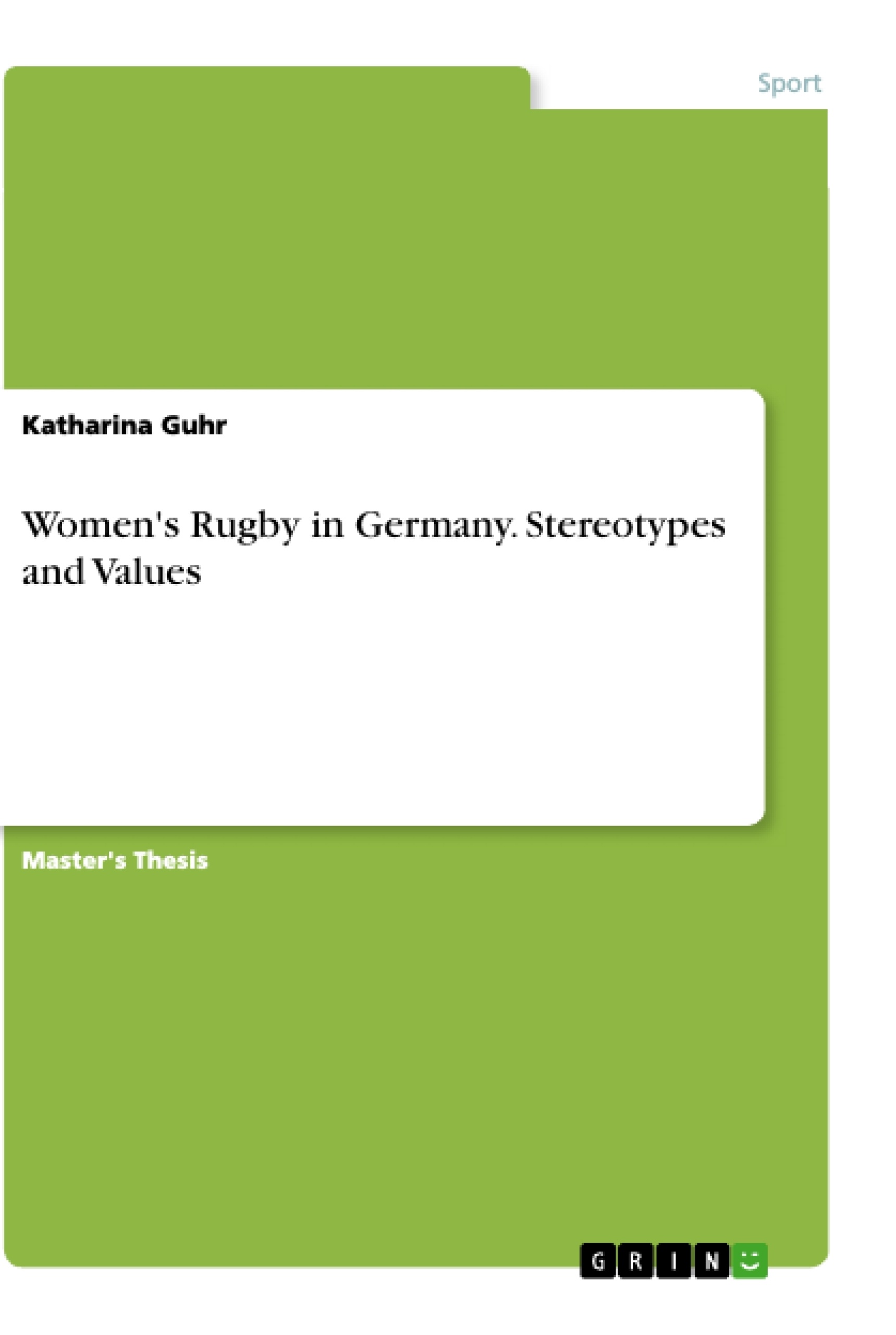Im Zuge dieser Arbeit soll Frauenrugby in Deutschland im kulturwissenschaftlichen Sinne näher beleuchtet werden. Hierbei wird sich besonders auf die Geschlechterrollen und die Rugbykultur und Gemeinschaft bezogen und diese in Vergleich zu Großbritannien gesetzt. Weil die Sportart mit vielen Vorurteilen belegt ist, und Rugby Stereotyp "maskulin" konnotiert ist, ist es notwendig, sich den Rollenbildern in dieser Sportart zu widmen. Zusätzlich wird der Vergleich mit Großbritannien erstellt, um verschiedene Problematisierungen mit einem Land zu kontrastieren, in dem Rugby ein Nationalsport ist. In dieser Masterarbeit werden daher am Beispiel von Frauenrugby in Deutschland tradierte Frauenbilder im Sport hinsichtlich Stereotypen und Vorurteilen untersucht und mit dem Vorreiter im Rugby Großbritannien verglichen. Ausgehend hiervon sollen die internationalen Werte und Chancen, die der Sport Frauen bietet, evaluiert werden.
Die Grundlage bilden Experteninterviews. Anhand dessen werden die drei häufigsten Stereotype, denen die Spieler*innen begegneten, herausgearbeitet. Diese beziehen sich zum einen auf Körperbilder und Homosexualität. Zum Anderen auf den direkten Vergleich mit dem Spiel der Männer und die damit einhergehende Annahme der verminderten Qualität des Frauensports. Diese wird durch mangelnde Finanzierung und daraus folgende geringe mediale Präsenz verstärkt. Darauf aufbauend wird die Rugbykultur in Deutschland und international beleuchtet und hinterfragt, inwieweit Frauen darin inkludiert sind und wie dies das Gruppengefühl des Sportes formt. Zum Schluss wird die sogenannte "dritte Halbzeit" untersucht und in diesem Zuge die Werte und der Zusammenhalt thematisiert.
Inhaltsverzeichnis (Table of Contents)
- Introduction
- Methodological Approach
- Theoretical Framework
- Hegemonic Femininity
- The Female (Un)apologetic
- Methodology
- Data
- Theoretical Framework
- The Development of Women's Sport and Rugby in Germany and the United Kingdom
- Gender Roles in Sport
- Rugby in the United Kingdom and Germany
- Organisation, Numbers and Facts of Women's Rugby
- Stereotypes in Women's Rugby
- Body Images and Identity Construction
- Homosexuality
- Not the Men's Game
- Rugby Culture
- Rugby Community
- Rugby Values
- The ‘Third Half-Time’
- Conclusion
Zielsetzung und Themenschwerpunkte (Objectives and Key Themes)
This master thesis aims to analyze women’s rugby in Germany from a cultural studies perspective, particularly focusing on gender roles, rugby culture, and community. The work compares these aspects to the United Kingdom, where rugby is a more established sport. The thesis explores how traditional gendered perceptions of women in sport are challenged by the increasing participation of women in rugby. It examines how these perceptions shape the experiences of women in rugby, including their identity construction and their interactions with the sport's culture and community.
- Gender roles and stereotypes in women's rugby
- The influence of rugby culture and community on women's experiences
- Comparisons between women's rugby in Germany and the United Kingdom
- The impact of traditional gendered perceptions on women's engagement in sport
- The role of media and financial support in shaping the visibility and recognition of women's rugby.
Zusammenfassung der Kapitel (Chapter Summaries)
The introductory chapter explores the existing perceptions of rugby in Germany, highlighting the challenges faced by women in the sport. It introduces the research question of what attracts women to rugby, considering the traditionally masculine connotations associated with the sport.
Chapter two outlines the methodological approach, including the theoretical frameworks of hegemonic femininity and the female (un)apologetic, used to analyze the data. It also details the research methodology and data collection strategies, emphasizing the importance of using qualitative methods such as interviews with players and coaches.
Chapter three delves into the historical development of women's sport and rugby in both Germany and the United Kingdom, examining the evolving gender roles and social norms that have shaped the sport. It discusses the organizational structures, participation numbers, and key facts about women's rugby in both countries, highlighting the significant differences in their development and recognition.
Chapter four focuses on the stereotypes associated with women's rugby, examining how they are constructed and how they impact the experiences of female players. The chapter discusses three key stereotypes: body images and identity construction, homosexuality, and the comparison to men's rugby.
Chapter five explores the role of rugby culture and community, investigating how these elements contribute to the experiences of women in the sport. It examines the values and traditions of rugby, including the significance of the ‘third half-time,’ and explores how these aspects contribute to the inclusivity and sense of belonging within the rugby community.
Schlüsselwörter (Keywords)
Women’s Rugby, Gender Roles, Stereotypes, Rugby Culture, Rugby Community, Germany, United Kingdom, Cultural Studies, Gender Studies, Hegemonic Femininity, The Female (Un)apologetic, Qualitative Research, Interviews.
Frequently Asked Questions
What are the common stereotypes faced by women in rugby?
The most common stereotypes involve body image concerns, assumptions about homosexuality, and the perception that women's rugby is of lower quality compared to the men's game.
Why is women's rugby in Germany compared to the United Kingdom?
The UK is used as a contrast because rugby is a national sport there, providing a different perspective on recognition, participation numbers, and organizational structure.
What is the "third half-time" in rugby culture?
The "third half-time" refers to the social gathering after a match, which is central to the sport's values, community building, and inclusivity.
What theoretical frameworks are used to analyze gender roles in this study?
The thesis utilizes the concepts of "hegemonic femininity" and the "female (un)apologetic" to understand how women navigate a traditionally masculine sport.
How does media presence affect women's rugby?
A lack of financial support leads to low media visibility, which in turn reinforces stereotypes and hinders the recognition of the sport's quality.
- Quote paper
- Katharina Guhr (Author), 2021, Women's Rugby in Germany. Stereotypes and Values, Munich, GRIN Verlag, https://www.grin.com/document/1141238



